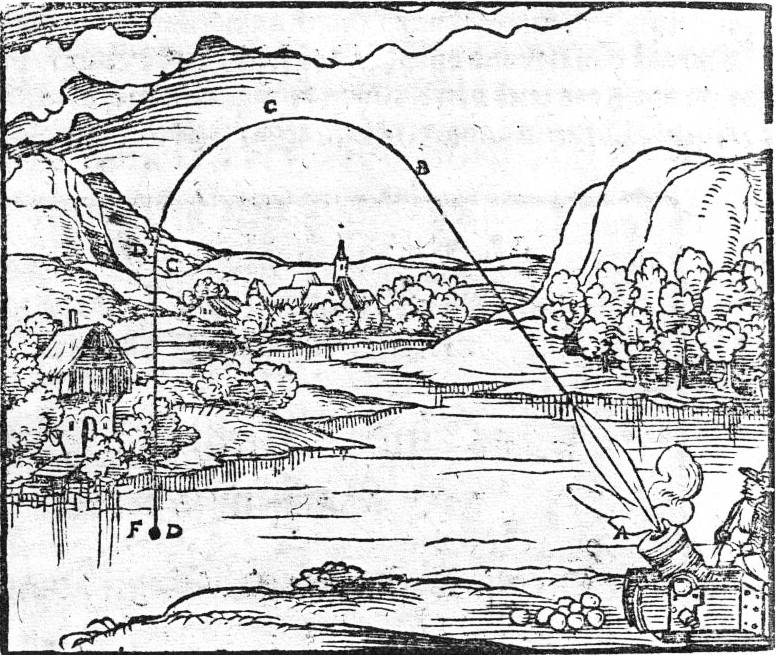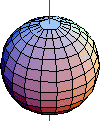|
Nur Ad-Din Al-Bitruji
Nur ad-Din al-Bitruji () (also spelled Nur al-Din Ibn Ishaq al-Betrugi and Abu Ishâk ibn al-Bitrogi) (known in the West by the Latinized name of Alpetragius) (died c. 1204) was an Iberian-Arab astronomer and a Qadi in al-Andalus. Al-Biṭrūjī was the first astronomer to present a non-Ptolemaic astronomical system as an alternative to Ptolemy's models, with the planets borne by geocentric spheres. Another original aspect of his system was that he proposed a physical cause of celestial motions. His alternative system spread through most of Europe during the 13th century. The crater Alpetragius on the Moon is named after him. Life Almost nothing about his life is known, except that his name probably derives from Los Pedroches (al-Biṭrawsh), a region near Cordoba. He was a disciple of Ibn Tufail (Abubacer) and was a contemporary of Averroes. Planetary model Al-Bitruji proposed a theory on planetary motion in which he wished to avoid both epicycles and eccentrics, and to a ... [...More Info...] [...Related Items...] OR: [Wikipedia] [Google] [Baidu] |
Islamic Golden Age
The Islamic Golden Age was a period of cultural, economic, and scientific flourishing in the history of Islam, traditionally dated from the 8th century to the 14th century. This period is traditionally understood to have begun during the reign of the Abbasid Caliphate, Abbasid caliph Harun al-Rashid (786 to 809) with the inauguration of the House of Wisdom in Baghdad, the world's largest city by then, where Muslim Ulama, scholars and polymaths from various parts of the world with different cultural backgrounds were mandated to gather and translate all of the known world's classical knowledge into Aramaic and Arabic. The period is traditionally said to have ended with the collapse of the Abbasid caliphate due to Mongol invasions and conquests, Mongol invasions and the Siege of Baghdad (1258), Siege of Baghdad in 1258. A few scholars date the end of the golden age around 1350 linking with the Timurid Renaissance, while several modern historians and scholars place the end of the Is ... [...More Info...] [...Related Items...] OR: [Wikipedia] [Google] [Baidu] |
Córdoba, Spain
Córdoba (; ),, Arabic: قُرطبة DIN: . or Cordova () in English, is a city in Andalusia, Spain, and the capital of the province of Córdoba. It is the third most populated municipality in Andalusia and the 11th overall in the country. The city primarily lies on the right bank of the Guadalquivir, in the south of the Iberian Peninsula. Once a Roman settlement, it was taken over by the Visigoths, followed by the Muslim conquests in the eighth century and later becoming the capital of the Umayyad Caliphate of Córdoba. During these Muslim periods, Córdoba was transformed into a world leading center of education and learning, producing figures such as Maimonides, Averroes, Ibn Hazm, and Al-Zahrawi, and by the 10th century it had grown to be the second-largest city in Europe. Following the Christian conquest in 1236, it became part of the Crown of Castile. Córdoba is home to notable examples of Moorish architecture such as the Mezquita-Catedral, which was named as a UNE ... [...More Info...] [...Related Items...] OR: [Wikipedia] [Google] [Baidu] |
John Philoponus
John Philoponus (Greek: ; ; c. 490 – c. 570), also known as John the Grammarian or John of Alexandria, was a Byzantine Greek philologist, Aristotelian commentator, Christian theologian and an author of a considerable number of philosophical treatises and theological works. He was born in Alexandria. A rigorous, sometimes polemical writer and an original thinker who was controversial in his own time, John Philoponus broke from the Aristotelian– Neoplatonic tradition, questioning methodology and eventually leading to empiricism in the natural sciences. He was one of the first to propose a "theory of impetus" similar to the modern concept of inertia over Aristotelian dynamics. Later in life Philoponus turned to Christian apologetics, arguing against the eternity of the world, a theory which formed the basis of pagan attacks on the Christian doctrine of Creation. He also wrote on Christology and was posthumously condemned as a heretic by the Church in 680–81 because of what w ... [...More Info...] [...Related Items...] OR: [Wikipedia] [Google] [Baidu] |
Theory Of Impetus
The theory of impetus was an auxiliary or secondary theory of Aristotelian dynamics, put forth initially to explain projectile motion against gravity. It was introduced by John Philoponus in the 6th century, and elaborated by Nur ad-Din al-Bitruji at the end of the 12th century. The theory was modified by Avicenna in the 11th century and Abu'l-Barakāt al-Baghdādī in the 12th century, before it was later established in Western scientific thought by Jean Buridan in the 14th century. It is the intellectual precursor to the concepts of inertia, momentum and acceleration in classical mechanics. Aristotelian theory Aristotelian physics is the form of natural science described in the works of the Greek philosopher Aristotle (384–322 BC). In his work ''Physics'', Aristotle intended to establish general principles of change that govern all natural bodies, both living and inanimate, celestial and terrestrial – including all motion, quantitative change, qualitative change, and subs ... [...More Info...] [...Related Items...] OR: [Wikipedia] [Google] [Baidu] |
Eudoxus Of Cnidus
Eudoxus of Cnidus (; grc, Εὔδοξος ὁ Κνίδιος, ''Eúdoxos ho Knídios''; ) was an ancient Greek astronomer, mathematician, scholar, and student of Archytas and Plato. All of his original works are lost, though some fragments are preserved in Hipparchus' commentary on Aratus's poem on astronomy. '' Sphaerics'' by Theodosius of Bithynia may be based on a work by Eudoxus. Life Eudoxus was born and died in Cnidus (also spelled Knidos), which was a city on the southwest coast of Asia Minor. The years of Eudoxus' birth and death are not fully known but the range may have been , or . His name Eudoxus means "honored" or "of good repute" (, from ''eu'' "good" and ''doxa'' "opinion, belief, fame"). It is analogous to the Latin name Benedictus. Eudoxus's father, Aeschines of Cnidus, loved to watch stars at night. Eudoxus first traveled to Tarentum to study with Archytas, from whom he learned mathematics. While in Italy, Eudoxus visited Sicily, where he studied ... [...More Info...] [...Related Items...] OR: [Wikipedia] [Google] [Baidu] |
Aristotle
Aristotle (; grc-gre, Ἀριστοτέλης ''Aristotélēs'', ; 384–322 BC) was a Greek philosopher and polymath during the Classical Greece, Classical period in Ancient Greece. Taught by Plato, he was the founder of the Peripatetic school of philosophy within the Lyceum (classical), Lyceum and the wider Aristotelianism, Aristotelian tradition. His writings cover many subjects including Physics (Aristotle), physics, biology, zoology, metaphysics, logic, ethics, aesthetics, Poetics (Aristotle), poetry, theatre, music, rhetoric, psychology, linguistics, economics, politics, meteorology, History of geology, geology, and government. Aristotle provided a complex synthesis of the various philosophies existing prior to him. It was above all from his teachings that Western culture, the West inherited its intellectual lexicon, as well as problems and methods of inquiry. As a result, his philosophy has exerted a unique influence on almost every form of knowledge in the West a ... [...More Info...] [...Related Items...] OR: [Wikipedia] [Google] [Baidu] |
Thomson Gale
Gale is a global provider of research and digital learning resources. The company is based in Farmington Hills, Michigan, west of Detroit. It has been a division of Cengage since 2007. The company, formerly known as Gale Research and the Gale Group, is active in research and educational publishing for public, academic, and school libraries, and businesses. The company is known for its full-text magazine and newspaper databases, Gale OneFile (formerly known as Infotrac), and other online databases subscribed by libraries, as well as multi-volume reference works, especially in the areas of religion, history, and social science. Founded in Detroit, Michigan, in 1954 by Frederick Gale Ruffner Jr., the company was acquired by the International Thomson Organization (later the Thomson Corporation) in 1985 before its 2007 sale to Cengage. History In 1998, Gale Research merged with Information Access Company and Primary Source Media, two companies also owned by Thomson, to form the ... [...More Info...] [...Related Items...] OR: [Wikipedia] [Google] [Baidu] |
Ptolemy
Claudius Ptolemy (; grc-gre, Πτολεμαῖος, ; la, Claudius Ptolemaeus; AD) was a mathematician, astronomer, astrologer, geographer, and music theorist, who wrote about a dozen scientific treatises, three of which were of importance to later Byzantine, Islamic, and Western European science. The first is the astronomical treatise now known as the ''Almagest'', although it was originally entitled the ''Mathēmatikē Syntaxis'' or ''Mathematical Treatise'', and later known as ''The Greatest Treatise''. The second is the ''Geography'', which is a thorough discussion on maps and the geographic knowledge of the Greco-Roman world. The third is the astrological treatise in which he attempted to adapt horoscopic astrology to the Aristotelian natural philosophy of his day. This is sometimes known as the ''Apotelesmatika'' (lit. "On the Effects") but more commonly known as the '' Tetrábiblos'', from the Koine Greek meaning "Four Books", or by its Latin equivalent ''Qua ... [...More Info...] [...Related Items...] OR: [Wikipedia] [Google] [Baidu] |
Ibn Bajjah
Abū Bakr Muḥammad ibn Yaḥyà ibn aṣ-Ṣā’igh at-Tūjībī ibn Bājja ( ar, أبو بكر محمد بن يحيى بن الصائغ التجيبي بن باجة), best known by his Latinised name Avempace (; – 1138), was an Arab Andalusian polymath, whose writings include works regarding astronomy, physics, and music, as well as philosophy, medicine, botany, and poetry. He was the author of the ''Kitāb an-Nabāt'' ("The Book of Plants"), a popular work on botany, which defined the sex of plants. His philosophical theories influenced the work of Ibn Rushd (Averroes) and Albertus Magnus. Most of his writings and books were not completed (or well-organized) due to his early death. He had a vast knowledge of medicine, mathematics, and astronomy. His main contribution to Islamic philosophy was his idea on soul phenomenology, which was never completed. Avempace was, in his time, not only a prominent figure of philosophy but also of music and poetry ... [...More Info...] [...Related Items...] OR: [Wikipedia] [Google] [Baidu] |
Rotation
Rotation, or spin, is the circular movement of an object around a '' central axis''. A two-dimensional rotating object has only one possible central axis and can rotate in either a clockwise or counterclockwise direction. A three-dimensional object has an infinite number of possible central axes and rotational directions. If the rotation axis passes internally through the body's own center of mass, then the body is said to be ''autorotating'' or '' spinning'', and the surface intersection of the axis can be called a '' pole''. A rotation around a completely external axis, e.g. the planet Earth around the Sun, is called ''revolving'' or ''orbiting'', typically when it is produced by gravity, and the ends of the rotation axis can be called the '' orbital poles''. Mathematics Mathematically, a rotation is a rigid body movement which, unlike a translation, keeps a point fixed. This definition applies to rotations within both two and three dimensions (in a plane and in spa ... [...More Info...] [...Related Items...] OR: [Wikipedia] [Google] [Baidu] |
Bernard R
Bernard (''Bernhard'') is a French and West Germanic masculine given name. It is also a surname. The name is attested from at least the 9th century. West Germanic ''Bernhard'' is composed from the two elements ''bern'' "bear" and ''hard'' "brave, hardy". Its native Old English reflex was ''Beornheard'', which was replaced by the French form ''Bernard'' that was brought to England after the Norman Conquest. The name ''Bernhard'' was notably popular among Old Frisian speakers. Its wider use was popularized due to Saint Bernhard of Clairvaux (canonized in 1174). Bernard is the second most common surname in France. Geographical distribution As of 2014, 42.2% of all known bearers of the surname ''Bernard'' were residents of France (frequency 1:392), 12.5% of the United States (1:7,203), 7.0% of Haiti (1:382), 6.6% of Tanzania (1:1,961), 4.8% of Canada (1:1,896), 3.6% of Nigeria (1:12,221), 2.7% of Burundi (1:894), 1.9% of Belgium (1:1,500), 1.6% of Rwanda (1:1,745), 1.2% of Germany (1 ... [...More Info...] [...Related Items...] OR: [Wikipedia] [Google] [Baidu] |







